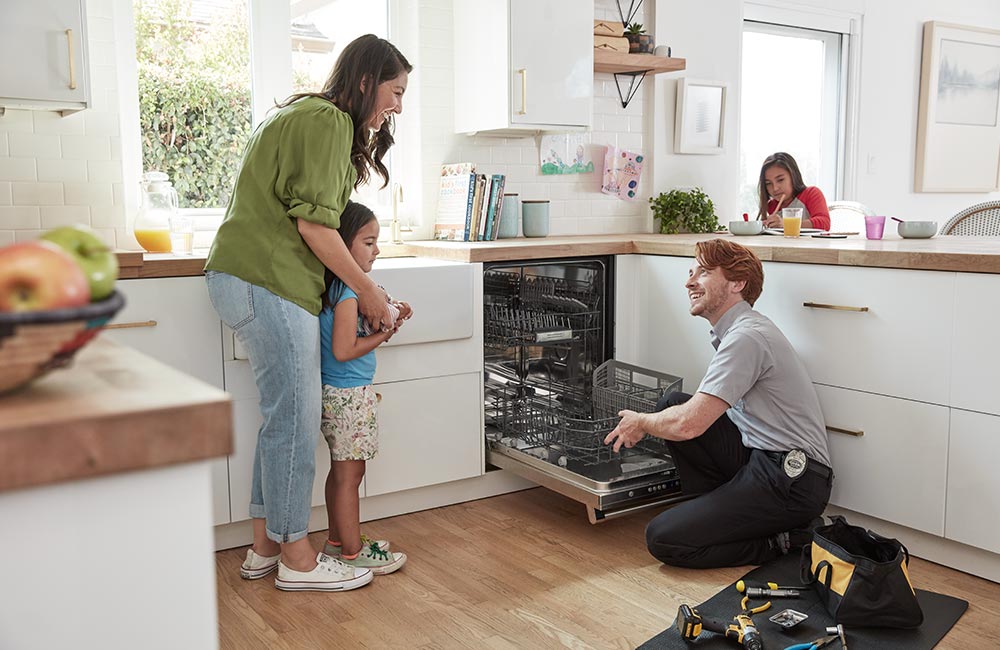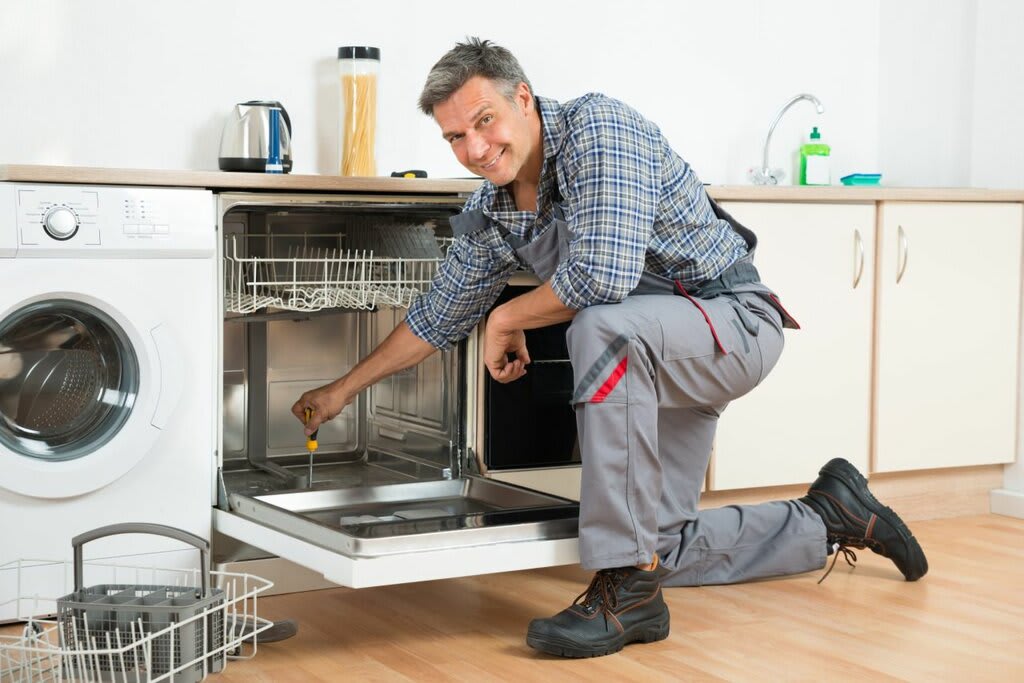A Comprehensive Check Out Do It Yourself Home Appliance Repair Work for Homeowners
If you have actually ever faced a defective appliance, you understand exactly how annoying it can be. Understanding common issues and utilizing the best troubleshooting strategies can save you time and cash. With the right tools and a bit of expertise, you might deal with minor repair services on your own. Yet when do you recognize it's time to call a professional? Let's check out the essentials of DIY device repair service and what you require to keep your home running efficiently.
Comprehending Usual Appliance Problems
When your devices begin breaking down, it can really feel frustrating, specifically if you're uncertain what the problem is. Typical concerns commonly occur with refrigerators, washing machines, and clothes dryers, and knowing what to search for can conserve you time and stress and anxiety. If your refrigerator isn't cooling, inspect the temperature level setups or pay attention for uncommon noises that may suggest a stopping working compressor.With cleaning machines, leakages generally stem from used tubes or damaged door seals. If your clothes dryer isn't home heating, a stopped up air vent could be the perpetrator.
Crucial Devices for DIY Repair Works
Having the right tools can make all the distinction in your do it yourself home appliance fixing efforts. Begin with a dependable toolset that consists of screwdrivers-- both flathead and Phillips-- since several home appliances use these sorts of screws. A tough pair of pliers is necessary for grasping, twisting, or cutting cables. You'll additionally desire an outlet established for eliminating screws and nuts that hold appliances together.A multimeter is crucial for inspecting electric connections and identifying issues. Do not fail to remember a level to ensure your devices sit properly, as this can influence efficiency. Think about buying a torque wrench for certain tightening up needs. Ultimately, a good flashlight or work light will aid you see right into tight or dark spaces. With these devices in hand, you'll be fully equipped to take on most DIY device fixings with confidence.
Troubleshooting Strategies for Devices
Before diving right into fixings, it is critical to identify the problem influencing your home appliance. Start by observing any kind of uncommon sounds, leakages, or error codes. Take note of when the concern takes place-- does it take place throughout certain cycles or under specific conditions? This can provide clues.Next, speak with the user manual for repairing suggestions. Numerous appliances consist of a repairing area that could resolve your problem directly. On-line sources, forums, and video clips can also offer beneficial insights.If you can, perform easy tests: for a washing equipment, check if the door lock is engaging properly; for a refrigerator, see if it's preserving the right temperature.Lastly, don't neglect to inspect power sources-- guarantee your appliance is connected in which breaker are functioning. By systematically tightening down the problem, you'll be better geared up to take on the repair efficiently.
Step-by-Step Repair Work Guides for Major Devices
While you could really feel discouraged by the idea of fixing significant home appliances, complying with a clear step-by-step overview can make the process convenient. Begin by identifying the trouble-- this might be anything from a fridge not cooling down to a cleaning device not spinning. When you've identified the concern, collect the essential devices like screwdrivers, pliers, and a multimeter.Next, consult your home appliance's guidebook for specific instructions and diagrams. This resource can be very useful for understanding exactly how to dismantle and reconstruct your device securely. Begin the repair by disconnecting the system and eliminating any type of panels or covers. Thoroughly examine components, replacing any kind of faulty parts as needed.After you've finished the repair work, reconstruct the home appliance and examination it to validate every little thing jobs effectively. Lastly, keep a record of your repair services for future recommendation. With practice, you'll get confidence in tackling more complicated problems.
Security Tips for Home Appliance Repair
Before you start any type of home appliance repair, ensure you're equipped with the right personal safety devices like handwear covers and security goggles. Always unplug the home appliance or transform off the source of power to stop any kind of accidents. Remaining safe is equally as vital as completing the repair work itself.
Individual Protective Equipment
When dealing with home appliance repair, it is important to prioritize your safety by using the best personal safety devices (PPE) Begin with safety and security goggles to protect your eyes from particles and potential sprinkles. Next off, put on gloves to secure your hands from sharp edges and hazardous materials. Relying on the appliance, you could also need a dirt mask to stay clear of inhaling dirt or fumes. Sturdy footwear is vital, too; pick closed-toe shoes to protect against injuries from hefty items. Lastly, consider utilizing knee pads if you'll be working with the flooring for extended periods. By outfitting yourself with correct PPE, you'll reduce threats and concentrate on the job available, making sure a safer and much more efficient fixing process.

Power Source Precautions
Making sure that a device is separated from its power source is essential for your safety and security during repair work (Fixes washers and dryers Oro valley Dependable Appliance Repair). Prior to you begin, disconnect the home appliance or turn off the circuit breaker. This basic action protects against electric shocks or accidents. Constantly double-check that the power is off utilizing a voltage tester-- don't depend on assumptions! If you're working with larger home appliances, consider using a lockout/tagout system to avoid unexpected resurgence. Maintain your workspace completely dry and free from mess to minimize risks. Use protected handwear covers and use tools with rubber holds to provide extra defense. Lastly, never attempt repair services in damp problems, as water and electricity don't mix. By complying with these safety measures, you'll develop a much safer atmosphere for your DIY repair work job
When to Call an Expert

Safety Concerns Initially
Although tackling do it yourself appliance repair work can be satisfying, it's critical to recognize your restrictions and focus on security. If you come across any indications of electric concerns, like triggers or unusual smells, stop immediately and call an expert. Don't attempt fixings involving gas lines or intricate circuitry unless you're extensively trained. Always disconnect devices prior to servicing them, and use protective equipment to secure on your own from potential hazards. If you're uncertain regarding a fixing or feel overloaded, seeking expert help is the most effective option. Your safety and security is much more vital than saving a couple of bucks. Remember, some repairs can lead to severe injury or further damage to your device if not managed correctly. Count on your reactions-- when doubtful, connect for specialist support.
Complicated Repair Issues
When home appliances breakdown beyond standard concerns, it's typically best to call in an expert. If your fridge isn't cooling, your washing maker will not rotate, or your stove will not heat up, these troubles can signify much more intricate issues. Trying to deal with these on your own can bring about further damage or security dangers. You could experience electric troubles, strange noises, or leaking liquids that call for specialized expertise and tools. If you're uncertain regarding the fixing procedure or click here do not have the necessary expertise, don't think twice to reach out for expert assistance. It can save you time, money, and the frustration of trial-and-error fixes. Trusting a qualified professional guarantees your appliances are restored safely and efficiently, allowing you to obtain back to your day-to-day regimen.
Guarantee Considerations
Before attempting any repairs, it is necessary to inspect if your appliance is still under guarantee. If it is, you might intend to avoid do it yourself repair work completely. Making alterations or opening the device could void the service warranty, leaving you liable for future repair services. Rather, get to out to the producer or accredited service center for professional help. They commonly have actually educated specialists who can diagnose and deal with issues promptly. If your home appliance is out of service warranty and you really feel confident in your skills, you can wage do it yourself repair work. If you're not sure or face complex problems, calling a professional is generally the safer selection. Remember, spending in professional help can conserve you time and stop more damage.
Preserving Your Appliances for Long life
To ensure your appliances serve you well for several years to come, routine maintenance is key. Beginning by cleaning your devices consistently; dust and particles can build up and impede efficiency. For refrigerators, inspect the door seals and tidy the coils to maintain them reliable. Wash your washing equipment's drum and dispensers to stop mold and mildew and odors.Don' t neglect to evaluate tubes and connections for leaks or put on. For dishwashers, run a cleaning cycle month-to-month to verify proper drainage and eliminate odors.Keep an eye on any uncommon sounds or efficiency issues-- resolving these early can prevent expensive fixings down the line (Dependable Refrigeration & Appliance Repair Service Washing Machine Repair). Refer to your home appliance handbooks for particular maintenance pointers and advised solution intervals. By adopting these practices, you'll not only prolong the life of your appliances but likewise improve their performance, conserving you money and time over time
Often Asked Questions
What Home appliances Are A Lot Of Typically Fixed by House Owners?
When it comes to DIY repairs, homeowners usually take on washing devices, dryers, fridges, and dishwashing machines. You'll find these devices are most frequently repaired given that they frequently encounter problems and can be manageable with standard tools.
Just How Can I Discover Device Repair Service Components Quickly?
You can find device repair work components easily by looking online merchants, visiting regional hardware stores, or examining producer internet sites. Don't neglect to have your appliance design number handy to ensure you get the appropriate parts.
Exist Online Resources for Do It Yourself Appliance Repair Service Videos?
Yes, there are plenty of on the internet sources for DIY device repair service video clips. YouTube is a terrific beginning, in addition to websites like RepairClinic and AppliancePartsPros, which use detailed guides to aid you repair and repair your appliances.
What Common Mistakes Should I Avoid During Repair works?
Throughout fixings, stay clear of rushing your work, missing safety and security preventative measures, or neglecting to check out handbooks. Don't presume you understand everything; request for help if required. Always maintain your workspace arranged to avoid losing devices or parts.
Just How Can I Inform if a Component Is Well Worth Repairing?
To figure out if a part's worth repairing, examine its expense contrasted to substitute. Check availability, simplicity of fixing, and whether the device's overall value validates the effort. If repair services set you back more, take into consideration changing it rather.